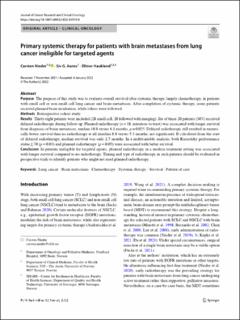Primary systemic therapy for patients with brain metastases from lung cancer ineligible for targeted agents
Peer reviewed, Journal article
Published version
Permanent lenke
https://hdl.handle.net/11250/3041739Utgivelsesdato
2022Metadata
Vis full innførselSamlinger
Originalversjon
Nieder, C., Aanes, S. G., & Haukland, E. (2022). Primary systemic therapy for patients with brain metastases from lung cancer ineligible for targeted agents. Journal of Cancer Research and Clinical Oncology, 1-8. 10.1007/s00432-022-03919-0Sammendrag
Purpose
The purpose of this study was to evaluate overall survival after systemic therapy, largely chemotherapy, in patients with small cell or non-small cell lung cancer and brain metastases. After completion of systemic therapy, some patients received planned brain irradiation, while others were followed.
Methods
Retrospective cohort study.
Results
Thirty-eight patients were included (28 small cell, 20 followed with imaging). Six of these 20 patients (30%) received delayed radiotherapy during follow-up. Planned radiotherapy (n = 18, intention-to-treat) was associated with longer survival from diagnosis of brain metastases, median 10.8 versus 6.1 months, p = 0.025. Delayed radiotherapy still resulted in numerically better survival than no radiotherapy at all (median 8.8 versus 5.3 months, not significant). If calculated from the start of delayed radiotherapy, median survival was only 2.7 months. In a multivariable analysis, both Karnofsky performance status ≥ 70 (p = 0.03) and planned radiotherapy (p = 0.05) were associated with better survival.
Conclusion
In patients ineligible for targeted agents, planned radiotherapy in a modern treatment setting was associated with longer survival compared to no radiotherapy. Timing and type of radiotherapy in such patients should be evaluated in prospective trials to identify patients who might not need planned radiotherapy.

